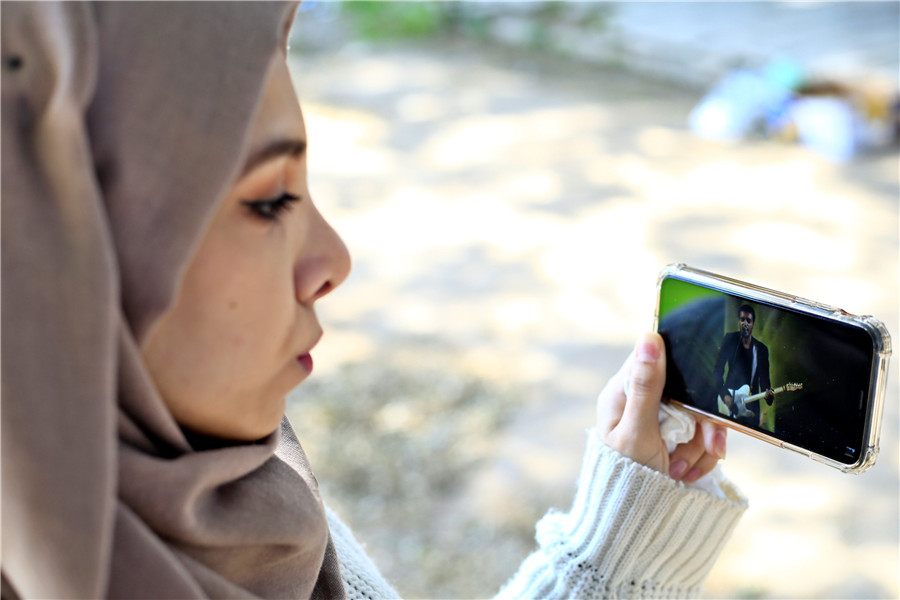Chinese smartphones reconnect with Iraqi consumers
China Daily | Updated: 2019-04-22 10:44

BAGHDAD - Over the past seven years, Iraqi consumers have gradually been attracted to the Chinese smartphones for their usability, affordability and advanced technologies.
In 2008, Chinese-made phones from little known manufacturers first entered the Iraqi market, but found a foothold due to their considerably low prices, new technologies such as touch-screen, hi-fidelity speakers, and attractive designs.
However, poor performance besmirched the image of Chinese phones relative to devices of Nokia and Samsung.
Now, a new class of Chinese smartphone manufacturers have quickly risen as tech giants in the world markets. Many of them found profitable niches in the Iraqi markets as well as in the world markets.
The crowded thoroughfare of al-Rubaie in eastern Baghdad has become the hot spot of wholesalers of cellphones, accessories, and spare parts. The shops there are also supplying other smartphone markets in Baghdad's other districts and across Iraq as well.
The Chinese smartphones are widely spread in the thoroughfare. In 2013, Huawei was the first Chinese smartphone manufacturer that played an instrumental role in changing the stereotype of the Chinese smartphones among Iraqi consumers.
The company introduced competitively priced devices with modern technology. It has slowly built its base in the country over the past seven years, and is now reaping the benefits.
Ahmed Hashim, sales manager of Huawei for central and south of Iraq, said his office managed to penetrate the market and gained customer trust gradually.
Huawei has surpassed Apple in the local market and is second only to Samsung. The company's market share is growing steadily year after year, powered by its cutting-edge technology.
According to Hashim, Huawei sold between 1.4 million to 1.6 million devices valued at $280 million in 2018. This made Huawei the second largest phone vendor in Iraq. Huawei sells no less than 150,000 devices a month all over Iraq now.
Hashim said: "We were No 1 in the world in selling the Huawei P Smart with 1,800 devices sold on the first day.
"Huawei phones are increasingly getting more attention and earning the trust of Iraqi consumers because of its reliable hardware, modern technologies, reasonable value, and cheap spare parts, compared to other phone manufacturers.
"Huawei, like many other companies in the Iraqi market, faces two major problems, unstable customs procedures and tariffs that lead to a fluctuation in the market."
The Iraqi customers also knew Honor, which is the sub-brand of Huawei group, since it is part of Huawei production line. Honor entered the Iraqi market about a year ago.
Ali Abbas, marketing manager of Honor for central and south of Iraq, said: "In one year, Honor smartphones reached a market share of 11 percent and are going up steadily.
"The high demand on Honor phones is due to the marketing plan, high quality of devices and state-of-the-art designs."
"We have got the first place in the Middle East for selling the 8X midrange device and we surpassed Samsung sales in Iraq in the first quarter of 2019."
Iraqi consumers came to know of Oppo smartphones through graymarket traders (with no official supplier authorization) in 2016. It was having a weak presence in the Iraqi market, but after Oppo managed to get global attention in mid-2018 with its unique and innovative Find X phone model, the Iraqi consumers warmed to the brand.
Ayman al-Badri, sales manager of Oppo Iraq, said: "Oppo phones have done exceptionally well in the still-developing markets of India and Southeast Asia, where it shoved aside the former leader Samsung with low-cost, high-quality phones that look much more expensive than they are.
"We believe it will do the same in Iraq in the foreseeable future. Oppo will open a regional office in Iraq soon in order to promote its products and assist the authorized distributor."
Opening the office "reflects the importance and potential of the Iraqi market to Oppo".
Al-Badri also said that in the first quarter of this year, Oppo's market share in Iraq went up from 3 percent to 5 percent.
"We currently sell about 10,000 devices a month, and that's only the beginning. The Iraqi market is so active and the purchasing power is high, a recent statistic shows that 350,000 devices are sold and activated every month all over Iraq. The number of retail shops in Baghdad alone increased 12 percent from 1,200 to 1,350."
Samsung, whose success led to Nokia's exit from the Iraqi market about a decade ago, remains No 1, but is feeling the heat of the Chinese phones. Its market share is decreasing bit by bit.
Mahmoud al-Anbagi, a retail shop owner in al-Mansour, an upscale neighborhood, said: "Chinese phones have become a powerhouse nowadays. A lot of Iraqi consumers prefer them over other expensive devices because of their beautiful designs, up-to-date technology, and reasonable prices."
Xinhua
























